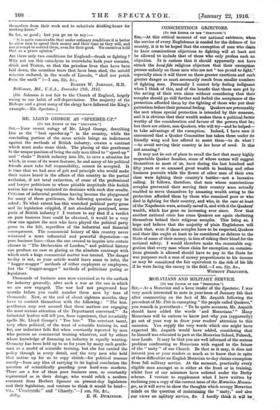MR. LLOYD GEORGE AS "SPEEDER-UP."
(To THE EDITOR OF THE "SPECTATOR.")
SIR,—Your recent eulogy of Mr. Lloyd George, describing him as the " best speeder-up " in the country, while the concluding portion of the same article brings an indictment against the methods of British industry, creates a contrast which must make some think. The placing of this gentleman in the unique position of being the only man fitted to " speed-up "
and " shake " British industry into life, to save a situation for which, in some of its worst features, he and many of his political friends must take full responsibility, cannot be accepted. It is time that we had men of grit and principle who would make their voices heard in the affairs of this country to the partial exclusion, if not total extinction, of some of the professional and lawyer politicians to whose pitiable ineptitude this foolish nation has so long entrusted its destinies with such dire results. Criticism of industrial problems having become the playground for many of these gentlemen, the following question may be asked : To what extent has this wretched political party game and its legislation crippled, if not absolutely paralysed, some parts of British industry ? I venture to say that if a verdict on pure business lines could be obtained, it would be a very Blear one against the men who have played the political party game to the hilt, regardless of the industrial and financial consequences. The commercial history of this country never witnessed a more influential and powerful deputation—on pure business lines—than the one created to inquire into certain clauses in " The Declaration of London," and political history can produce no case so glaring as the absolute contempt with which such a huge commercial matter was treated. The danger to-day is not, as your article would leave some to infer, the " hugger-mugger " methods of either employers or employees, but the " hugger-mugger " methods of politicians posing as legislators.
Thousands of business men were exercised as to the outlook for industry generally, after such a war as the one in which we are now engaged. The war had not progressed four months before you could number these men by tens of thousands. Now, at the end of about eighteen months, they have to content themselves with the following : " The hon. gentleman may rest assured that these matters are engaging the most serious attention of the Department concerned." As industrial leaders will tell you, from experience, that invariably spells Mr. Lloyd George's " Too late." The constant taunt, very often political, of the want of scientific training in, and for, our industries falls flat when constantly repeated by men who possess no commercial training whatever, and by others whose knowledge of financing an industry is equally wanting. Germany has been held up to us for years by many such gentle- men as a model of scientific training, but she has carried the policy through in every detail, and the very men who held that nation up for us to copy shrink—for political reasons mostly—from any idea of carrying to its logical conclusion the question of scientifically guarding your hard-won markets. There are a few of these poor business men, so constantly represented as in their dotage, who would relish a modern comment from Herbert Spencer on present-day legislators and their legislation, and venture to think it would be brief— viz., "Unscientific" and " Ghastly."—I am, Sir, &c.,


































 Previous page
Previous page